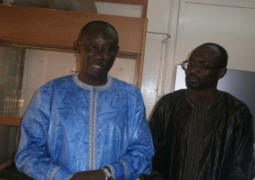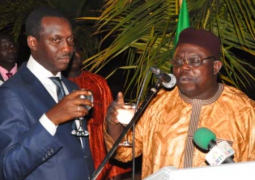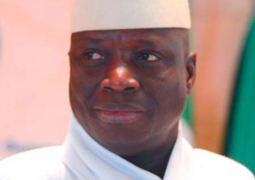There were four accused persons, but the first accused was reported to be at large.
After summarizing the testimonies of the witnesses, who testified on behalf of the prosecution and the defence, Magistrate Jobarteh told the court he must take the counts separately in his analysis, adding that conspiracy, the first count, is contrary to Section 368 of the CPC.
Delivering his judgment, he said the particulars of the offence stated that the first accused and the first defence witness in August 2012 conspired among themselves to commit felony to wit stealing.
He posited that to prove their case, the prosecution must establish the commission of the offence of conspiracy by proving with evidence the following: an agreement between the first and second accused persons to undertake an act; their agreement must lead to the commission of the alleged offence; the alleged offence must be felonious.
Magistrate Jobarteh stated that he must say that in the whole of the testimonies of PW1 and PW2, no iota of evidence, not even the name of DW2 was mentioned.
He adduced further that PW1’s evidence was to the effect that the first accused told him that he had given the vehicle to a Jola boy who disappeared with the vehicle.
He said no further evidence was led on the said Jola boy and he was not identified.
Jobarteh added that even in the evidence of DW1 which should not have been analysed to determine a prima facie case, did not mention the said Jola boy.
He posited that there was doubt as to who Jola boy was and this doubt must be resolved in favour of the accused person.
Still delivering his judgement, Magistrate Jobarteh told the court that as earlier stated, nowhere in the narrations did both witnesses for the prosecution led either direct or circumstantial evidence on the alleged conspiracy between the first and second accused persons.
“It must be borne in mind that agreement is the essence of conspiracy,” Magistrate Jobarteh told the court.
He indicated that such an agreement could be proved by primary and direct evidence, as well as could be inferred from the circumstances.
He said the key test for the prosecution was to proffer evidence either directly or by circumstantial inferences to show that the accused persons had agreed to prosecute a common design.
“Therefore in the absence of any evidence to prove that the first and second accused persons had conspired or agreed to prosecute an illegal enterprise, a felony as alleged in this case, I hold that the essential element of the offence of conspiracy is not proved. The second accused, Papa Kanuteh, is hereby discharged and acquitted of count one,” Magistrate Jobarteh declared.
On the count of stealing leveled against the second accused, he reiterated that the onus was on the prosecution to prove the elements of stealing, which are dishonesty; appropriation of property belonging to another; with the intention of permanently depriving the owner of it.
He adduced further that again both PW1 and PW2 had not given convincing evidence tending to prove that the second accused had indeed stolen the vehicle, adding that the cross-examination that ensued after the evidence of the prosecution witnesses too did not disclose evidence on the culpability of the second accused.
Magistrate Jobarteh said that Section 166 of the CPC placed a duty on the court to examine from the evidence of PW1 and PW2 to determine whether it had established a prima facie case or not.
He posited that PW1, the owner of the subject matter of the alleged stealing, did not mention stealing of his vehicle by either the first accused or any of the accused persons.
From the totality of the evidence led by the prosecution, stated Magistrate Jobarteh, there was no evidence to prove even one afore-mentioned essential element in the alleged offence against the second accused.
Therefore, he continued, the evidence adduced by the prosecution on the alleged offence of stealing had been so manifestly unreliable that no reasonable tribunal could safely convict on it.
“I hereby acquit and discharge the second accused of count two,” Magistrate Jobarteh told the court.
He further stated that on count three, the second accused and third accused were charged with willfully and unlawfully scrapping the vehicle of PW1.
He added that he had made recourse to the cited Section of the Criminal Code and had discovered that the said Section deals with willful damage to boundary and survey marks.
He adduced that the purport of the said Section was different from the particulars of the offence the second and third accused persons were charged with.
“This court is advised to refrain from convicting an accused person on an offence unknown to the law,” Magistrate Jobarteh told the court, adding that if an accused person is charged with an offence unknown to the law, a conviction based on it will be quashed.
Therefore, he stated, the second and third accused persons were acquitted and discharged.
Continuing the delivering of his judgement, he told the court that in proving the guilt of the fourth accused person, the prosecution must prove the important elements that he had received the property in question and also had knowledge of the fact that the property so received was stolen.
Magistrate Jobarteh said the knowledge that the property was stolen was required before he would be guilty of the offence.
“An accused will however be deemed to have such knowledge if judging from circumstances of the case, a reasonable man ought to have suspected the property in question to have been stolen,” he stated.
Magistrate Jobarteh indicated that there was nothing in the evidence of the prosecution witnesses and the ensuing cross-examination to lead to the conclusion that the fourth accused received stolen property, knowing or believing it to be stolen, adding that even if there was theft of the subject matter, he had no knowledge of it and the circumstances were such that he had no reason to believe that the scrapped metals were stolen.
“I have no option than to acquit and discharge the fourth accused of the offence of receiving stolen property,” Magistrate Jobarteh declared.
He finally stated that the second accused was acquitted and discharged of both counts one and two, the second and third accused persons were acquitted and discharged of count two and the fourth accused person was acquitted and discharged of count four.
“This is my judgement,” said Magistrate Jobarteh.
Read Other Articles In Article (Archive)
Narcotic officer testifies in court
Jul 2, 2010, 1:07 PM




